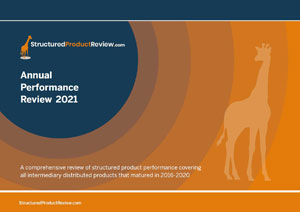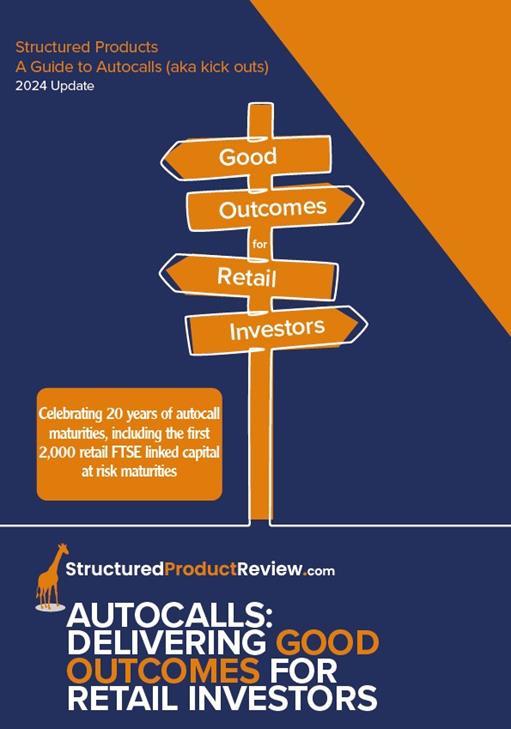Max Darer, Lowes Financial Management, 17/04/2024
The first three months of the year saw a busy period for the UK retail sector and structured product issuance. The sector also saw the introduction of a new counterparty to the UK sector in Canadian Imperial Bank of Commerce (CIBC). Whilst CIBC aren’t classified as a Globally Systemically Important Bank, they are a leading North American Institution and are one of the highest rated banks by credit rating agencies. CIBC backed retail structured products will be offered exclusively by a new provider, hop investing. hop are set up in a similar way to MB Structured Investments as an appointed representative of Meteor Asset Management.
Another counterparty re-entered the sector in Santander UK, after a period of five-years out of the market. Santander is back offering deposit-based contracts via Walker Crips. We certainly welcome the addition of two more counterparties to the sector, increasing potential for diversification of counterparty exposure.
Q1 2024 saw 204 structured products issued (by strike date), utilising 12 different counterparties. 63 of the 204 were deposit-based or capital ‘protected’ plans. By comparison to the same period in 2023, issuance has been over 13% greater.
11 different providers consistently issued plans during the quarter, the chart below showing the split between autocalls, income and growth products. Walker Crips, MB and Meteor sticking out as the largest issuers by volume.
The mainstay of the UK retail sector being FTSE 100* linked capital at risk autocalls, remained as the most commonly issued product type, accounting for over 43% of total issuance in the quarter. The average advertised coupon for these was 7.77%, ranging from 6.25% on step-downs to 11% per annum on hurdle contracts.
Whilst no autocall contract had a maximum term of less than five-years, we remain outspoken about the fact that the longer an autocall has to run, the greater chance it has to mature positively. Extended market drawdowns are more likely to be negated the longer a plan has to run. Almost 43% of capital at risk autocalls had a maximum term of just five years whereas just over 30% had maximum terms of 7 years or more. By comparison to 2019 in what seemed to be the peak of longer term issuance of autocalls, over 80% of new issues had a duration of more than 6 years and no capital at risk autocall had a term of less than 6 years.
2024 will see another bank of 6-year maximum term autocalls relying on their final observation for positive maturity, otherwise capital will be returned provided there is not an extreme market correction.
*including FTSE CSDI
Further evidence above of continued use of FTSE 100 as the most favoured underlying.
To read our article discussing Q1 2024 maturity results click here.
All data sourced from StructuredProductReview.com
Structured investments put capital at risk.
Also in this section
- How old is too old? Are structured products to die for?
- Product focus - October 2024
- Q3 2024 Issuance
- Q3 2024 maturity results
- A share of spread bets on steroids?
- Product focus - September 2024
- Maturities of the month - August 2024
- Right on time
- Product focus - August 2024
- Keep calm and zoom out
- 2,000 and counting
- Q2 2024 maturity results
- 20 years of autocall maturities
- Product focus - June 2024
- Fixed income or interest?
- Maturities of the month - May 2024
- The barrier debate - revisited
- Product focus - April 2024
- Maturities of the month - April 2024
- Time to call
- I don't believe markets are ever too high for Structured products!
- Notes on counterparty exposure
- Return of Nikkei
- Q1 2024 issuance
- Q1 2024 maturity results
- Structured Products – AAAAAGH!
- Hop in CIBC
- Re-enter Santander
- How to build a financial fortune - revisited
- Issuance in 2023
- Where's the risk?
- Questionable offerings
- Challenging the case against structured products - 'Loss of dividends'
- Navigating the investment landscape
- Challenging the case against structured products - Counterparty risk
- 6-year autocalls approaching final destination
- 1,750 FTSE capital at risk autocall maturities
- The leopard that changed her spots
- Q3 2023
- Challenging the case against structured products - Keydata
- Dilemmas for UK IFA's and the unique role of Structured Products
- 'High charges'
- Precipice bonds
- Intro
- FTSE 100 Contingent Income
- Indexing the indices
- Something different
- Investing through volatility
- 100 10:10s
- The best or worst?
- The 10%/25% 'Rule' that never was
- Structured products and the yield curve
- Fixed income: Capital at risk?
- Prospects for UK inflation - and fun with A.I!
- The Barrier Debate
- More Deposits for now
- Last of the Americans
- What if?
- Time heals all wounds, we hope...
- How to diversify portfolios using structured products?
- The Proof Is In The Pudding...
- Debunking Structured Misconceptions
- 1,500 FTSE Capital-at-Risk Autocall Maturities
- Q3 2022 Maturity Results
- What do we prefer?
- Deposits vs Capital ‘Protected’
- There’s time yet…
- Where did you invest your clients?
- A Six-Month Reflection
- Return of the Rev Con
- Happy 2nd Birthday FTSE CSDI
- Q2 2022 Maturity Results
- The best and worst yet still the best
- Critique my Suitability - Mariana 10:10 Plan June 2022 (Option 2)
- 10/10 for 55 10:10’s
- Q1 2022 Maturity Results
- 'How to build a financial fortune': a follow up
- Critique my Suitability - Mariana 10:10 Plan April 2022 (Option 2)
- 2021 Capital-at-Risk Autocall Maturity Review
- An unwelcome return...
- CSDI's First Birthday
- Bon Anniversaire
- Introducing the FTSE Custom 100 Synthetic 3.5% Fixed Dividend Index
- Q3 2021 Maturity Results
- Critique my Suitability - Mariana 10:10 Plan October 2021 (Option 2)
- Blurring the lines...
- Beware of false knowledge; it is more dangerous than ignorance
- Good news, bad news...
- Certainty is Certainly a Benefit
- Critique my Suitability - Mariana 10:10 Plan September 2021 (Option 2)
- A Twenty-Year Progression
- Q2 2021 Maturity Results
- Nine 8:8s Post Positive Returns in Falling Markets
- Critique my Suitability
- Q1 2021 Maturity Results
- Morgan Stanley’s Marvelous Maturity Medley
Current Products
We review the UK's retail structured investment sector, providing pertinent support for Professional Advisers and relevant research tools.
View all ⟶


